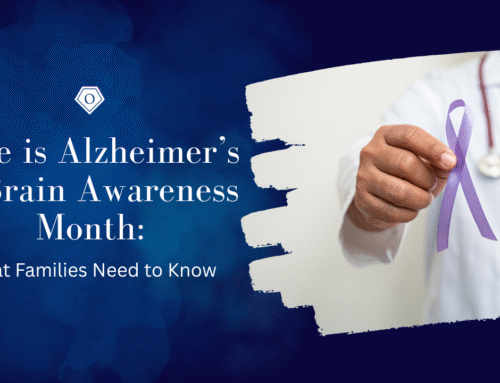Caring for a loved one with dementia can be a profound and emotional journey as their cognitive abilities gradually decline. In this complex role of caregiving, it’s crucial to address not only the immediate challenges of memory loss and confusion but also to look after their long-term health. One critical aspect of dementia care is helping your loved one manage their cholesterol levels. Elevated cholesterol can significantly increase the risk of cardiovascular disease, which poses an additional threat to their well-being. In this endeavor, caregivers play a pivotal role in ensuring that the individual receives the necessary support, guidance, and attention to maintain a heart-healthy lifestyle, making every effort to safeguard their overall health and quality of life.
Keys for managing a loved one’s cholesterol:
Medication Management:
Many individuals with dementia may be prescribed cholesterol-lowering medications (statins) by their healthcare provider. Caregivers should ensure that their loved one takes these medications as prescribed and is monitored for potential side effects.
Dietary Choices:
Promote a heart-healthy diet by providing foods low in saturated and trans fats. Encourage a diet rich in fruits, vegetables, whole grains, and lean proteins.
Limit the consumption of red meat, processed foods, and foods high in cholesterol, such as egg yolks and organ meats.
Consider consulting a registered dietitian to create a personalized meal plan considering the individual’s dietary preferences and restrictions.
Physical Activity:
Encourage regular physical activity, as it can help lower cholesterol levels. Activities like walking, swimming, or gentle exercises can be beneficial, but the activity level should be appropriate for the individual’s abilities and limitations.
Medication Side Effects:
Be vigilant for potential side effects of cholesterol-lowering medications, as individuals with dementia may have difficulty expressing their discomfort. Common side effects may include muscle pain, weakness, and confusion.
Regular Medical Check-Ups:
Ensure that your loved one has regular medical check-ups to monitor cholesterol levels and overall cardiovascular health. Regular visits to a healthcare provider can help detect and address any issues promptly.
Communication:
Maintain open communication with the healthcare team, and don’t hesitate to ask questions or seek clarification on any concerns related to cholesterol management.
Safety:
Pay attention to safety in the home, such as keeping medications out of reach and ensuring the individual takes the prescribed dose and not more or less than instructed.
Emotional and Psychological Support:
Caregiving for someone with dementia can be emotionally challenging. Consider seeking support from healthcare professionals or support groups to manage the stress and emotions associated with caregiving.
Care Planning:
Work with the healthcare team to create a comprehensive care plan that addresses the specific needs of your loved one, taking into account their dementia and cholesterol management requirements.
Remember that individuals with dementia may have difficulty remembering and following instructions, so caregivers must take an active role in managing their loved one’s cholesterol. Creating a supportive, safe, and healthy environment is essential for their overall well-being.
Getting individuals with dementia to follow critical health instructions can be challenging but is essential for their well-being.
Strategies that may help people with dementia follow through:
Simplify Instructions:
Break down instructions into simple, step-by-step tasks. Use clear, concise language, and avoid complex medical jargon. For example, instead of saying, “You need to manage your cholesterol levels,” say, “Let’s take this pill to help keep your heart healthy.”
Visual Aids:
Use visual aids, such as pictures, charts, or pill organizers, to help convey instructions. Visual cues can make it easier for individuals with dementia to understand and remember what they need to do.
Routine and Consistency:
Establish a daily routine for managing cholesterol, including taking medications and dietary choices. Consistency can help individuals with dementia feel more comfortable and confident in following the instructions.
Engage and Involve:
Involve them in the decision-making process as much as possible. Offer choices within reason, such as asking if they prefer apples or pears as a healthy snack. This can help them feel more in control and engaged in their own care.
Sensory Reminders:
Use sensory cues to prompt action. For example, if it’s time to take medication, you might set an alarm or place the medication near a favorite chair. Using familiar sounds, sights, or smells associated with a specific task can help trigger the right response.
Positive Reinforcement:
Offer positive feedback and rewards when they follow instructions correctly. Praise and encouragement can be powerful motivators. You might say, “Great job taking your medication today!” or offer a small treat as a reward.
Model Behavior:
Sometimes, showing them how to do something can be more effective than telling them. Demonstrate the desired behavior, like taking medication, and ask them to follow along.
Caregiver Patience:
Be patient and empathetic. Individuals with dementia may need more time to process information and carry out tasks. Avoid rushing them, and provide gentle reminders when necessary.
Memory Aids:
Use memory aids like sticky notes, whiteboards, or voice reminders to reinforce instructions. These visual or auditory cues can serve as prompts for essential tasks.
Professional Support:
Consult with healthcare professionals, including physicians and occupational therapists, who specialize in dementia care. They can provide additional guidance and strategies to improve compliance with health instructions.
Family and Social Support:
Involve other family members or friends who may be able to provide additional support and encouragement. Having a support network can make it easier for individuals with dementia to follow instructions.
Adapt to Changing Needs:
Recognize that the abilities and needs of individuals with dementia may change over time. Be flexible and adjust your approach as necessary.
Individuals with dementia may have good days and challenging days. Be prepared for resistance or forgetfulness, and avoid confrontation. A compassionate and adaptable approach is often the most effective way to encourage them to follow critical health instructions.






